苏教版七年级英语下册知识点(2)
苏教版七年级下册Unit-1-2重点短语

Unit 11. 巴黎是法国的首都。
Paris is the capital of France.2. 在市中心(两种)in the centre of the city/city centre3. 我妹妹和我共住同一个卧室。
(同义句)My sister and I live in the same bedroom.I share a bedroom with my sister.4. 我有我自己的卧室。
(两种)I have my own bedroom.=I have a bedroom of my own.5. 向外看海滩、朝窗外看look out at the beachlook out of the window6. 花园是种花的最好的地方。
A garden is the best place to grow flowers.7. 离伦敦十五英里远的一个城镇a town 15 miles away from London8. 一栋带有美丽花园的大房子a big house with a beautiful garden9. 这个杯子里装满了牛奶。
The glass is full of milk.10. 完全不同于be quite different from11. 我希望很快能见到你。
(两种)I hope to see you soon.I hope I can / will see you soon.12. 将来某一天some day13. 叫某人(不要)做某事ask sb. (not) to do sth.14. 五号大街最大的那一家the biggest one in Fifth Street15. 在床上听音乐listen to music in bed16. 法国有超过260,000平方英里的面积。
(两种)France has an area of over 260,000 square miles. France is more than 260,000 square miles in size.17. 第一个来学校the first to come to school18. 在山脚下at the foot of a hill19. 第十页1page ten20. 五加七等于多少?十二。
新版牛津译林苏教版小学英语七年级下册各单元知识汇总
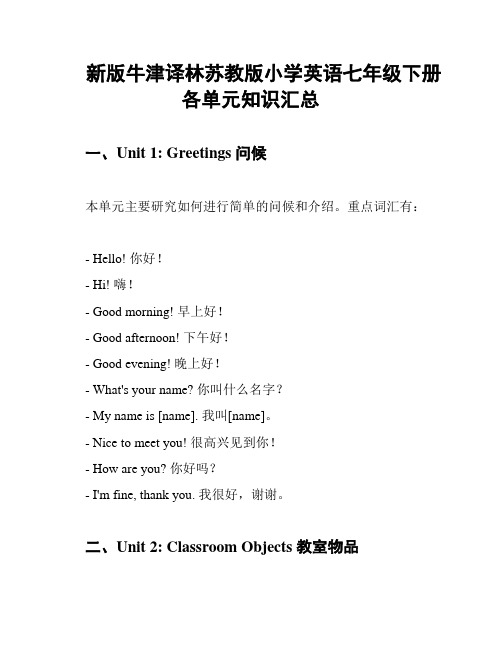
新版牛津译林苏教版小学英语七年级下册各单元知识汇总一、Unit 1: Greetings 问候本单元主要研究如何进行简单的问候和介绍。
重点词汇有:- Hello! 你好!- Hi! 嗨!- Good morning! 早上好!- Good afternoon! 下午好!- Good evening! 晚上好!- What's your name? 你叫什么名字?- My name is [name]. 我叫[name]。
- Nice to meet you! 很高兴见到你!- How are you? 你好吗?- I'm fine, thank you. 我很好,谢谢。
二、Unit 2: Classroom Objects 教室物品本单元主要研究教室里常见的物品。
重点词汇有:- desk 课桌- chair 椅子- book 书- pen 笔- pencil 铅笔- ruler 尺子- eraser 橡皮擦- bag 书包- notebook 笔记本- blackboard 黑板三、Unit 3: Numbers 数字本单元主要研究基本的数字表达。
重点词汇有:- one 一- two 二- three 三- four 四- five 五- six 六- seven 七- eight 八- nine 九- ten 十四、Unit 4: Family 家庭本单元主要研究家庭成员的称呼。
重点词汇有:- father 父亲- mother 母亲- brother 兄弟- sister 姐妹- grandfather 爷爷- grandmother 奶奶- aunt 阿姨- uncle 叔叔- cousin 堂兄弟/堂姐妹五、Unit 5: Colors 颜色本单元主要研究颜色的表达。
重点词汇有:- red 红色- blue 蓝色- yellow 黄色- green 绿色- orange 橙色- purple 紫色- black 黑色- white 白色- pink 粉色- brown 棕色六、Unit 6: Weather 天气本单元主要研究天气的描述。
七年级下册英语知识点苏教

七年级下册英语知识点苏教七年级下册英语知识点英语是一门重要的国际语言,学好英语能够帮助我们更好地融入国际社会,也能够为我们的学业和工作带来更多的机会。
在七年级下册的英语课程中,我们需要学习和掌握的知识点有很多,以下是一些比较重要的知识点:1. 时态英语中时态的使用是非常重要的,时态的使用不正确会影响到我们的表达和交流。
在七年级下册的英语课程中,我们需要学习和掌握一些基本的时态,比如一般现在时、一般过去时和一般将来时等。
特别是一般现在时,它是英语中最基础、最常用的时态。
我们需要学会如何正确地使用它,例如:主语+动词原形(第三人称单数要加-s)。
2. 问句和回答在交流中,正确地提问和回答非常重要。
我们需要学习和掌握一些基本的问句和回答,例如:what、where、how much、how many、what time、how等。
同时,我们也需要学习和掌握一些基本的回答方式,例如:Yes或No回答、简短回答和完整回答等。
在练习时,可以多找一些同学进行练习,加强问答技能。
3. 词汇和语法词汇和语法是英语学习中非常重要的部分,我们需要通过大量的练习来掌握各种词汇和语法。
在七年级下册的英语课程中,我们需要学习和掌握一些基本的词汇,例如:颜色、食物、数字、动物等。
同样,我们也需要学习和掌握一些基本的语法,例如:名词、形容词、副词、介词和连词等。
4. 阅读阅读是英语学习中非常重要的环节,通过阅读我们可以扩展我们的词汇和语法,也能够提高我们的阅读理解能力。
在七年级下册的英语课程中,需要学习和掌握一些基本的阅读技巧,例如:快速阅读、扫读和细读等。
同时,也需要学习和掌握一些基本的阅读策略,例如:分类、概括和推断等。
总之,七年级下册的英语课程需要我们学习和掌握大量的知识点,需要我们通过课堂学习和课后练习不断巩固和提高。
只有掌握了这些知识点,我们才能够在英语学习中走得更远。
(完整版)苏科版英语七年级下册知识点总结

(完整版)苏科版英语七年级下册知识点总结苏科版英语七年级下册知识点总结Unit 1: Hello!- Greetings- Personal introductions- Numbers 11-20- Classroom objectsUnit 2: School Life- Subjects and school activities- Classroom instructions- Time and daily routines- Adverbs of frequencyUnit 3: My Family and Friends- Family members- Describing people's appearance and personality - Possessive adjectives- Present continuous tenseUnit 4: Let's Celebrate!- Festivals and celebrations- Customs and traditions- Food and drinks- ImperativesUnit 5: Shopping Madness- Shopping vocabulary- Money and prices- Simple present tenseUnit 6: Out and About- Places in the town- Giving directions- Transportation- Prepositions of placeUnit 7: Health and Fitness- Parts of the body- Describing illness and symptoms- Giving advice- Modal verbs (should, should not, can, cannot) Unit 8: Nature and Environment- Animals and plants- Weather and seasons- Nature conservation- Present continuous tense (future arrangements)Unit 9: Food and Lifestyle- Food and drinks- Healthy/unhealthy habits- Expressing preferences- Can/Can't for abilityUnit 10: Around the World- Countries and nationalities- Travel and tourism- Cultural differences- Past simple tenseUnit 11: Hobbies and Interests- Free time activities- Sports and hobbies- Expressing likes and dislikes- Present continuous tense (future plans)- Expressing opinions- Forming questions- Reported speech以上是苏科版英语七年级下册的知识点总结,每个单元涵盖了相关的话题和语法知识。
苏教版七年级下册英语知识点
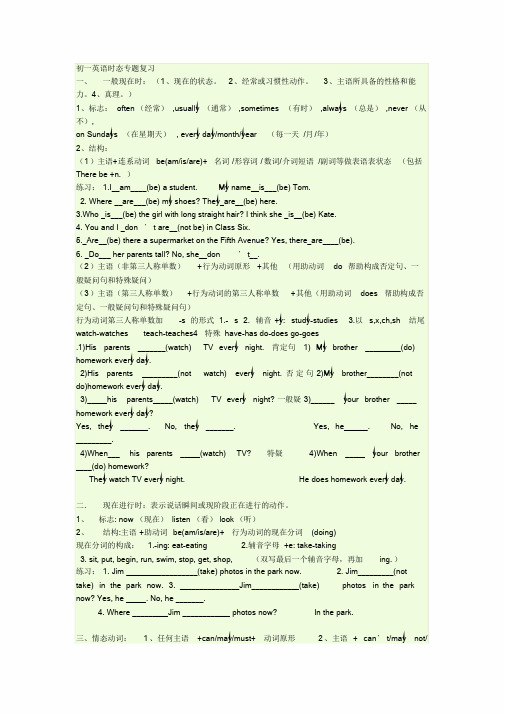
初一英语时态专题复习一、一般现在时:(1、现在的状态。
2、经常或习惯性动作。
3、主语所具备的性格和能力。
4、真理。
)1、标志:often (经常),usually (通常),sometimes (有时),always (总是),never (从不),on Sundays (在星期天), every day/month/year (每一天/月/年)2、结构:(1)主语+连系动词be(am/is/are)+ 名词/形容词/数词/介词短语/副词等做表语表状态(包括There be +n. )练习:1.I__am____(be) a student. My name__is___(be) Tom.2. Where __are___(be) my shoes? They_are__(be) here.3.Who _is___(be) the girl with long straight hair? I think she _is__(be) Kate.4. You and I _don ’t are__(not be) in Class Six.5._Are__(be) there a supermarket on the Fifth Avenue? Yes, there_are____(be).6. _Do___ her parents tall? No, she__don ’t__.(2)主语(非第三人称单数)+行为动词原形+其他(用助动词do 帮助构成否定句、一般疑问句和特殊疑问)(3)主语(第三人称单数)+行为动词的第三人称单数+其他(用助动词does 帮助构成否定句、一般疑问句和特殊疑问句)行为动词第三人称单数加-s 的形式 1.- s 2. 辅音+y: study-studies 3.以s,x,ch,sh 结尾watch-watches teach-teaches4 特殊have-has do-does go-goes.1)His parents _______(watch) TV every night. 肯定句1) My brother _________(do) homework every day.2)His parents _________(not watch) every night. 否定句2)My brother________(not do)homework every day.3)_____his parents_____(watch) TV every night? 一般疑3)______ your brother _____ homework every day?Yes, they _______. No, they _______. Yes, he______. No, he _________.4)When___ his parents _____(watch) TV? 特疑4)When _____ your brother ____(do) homework?They watch TV every night. He does homework every day.二.现在进行时:表示说话瞬间或现阶段正在进行的动作。
苏教版牛津英语七年级下册第七单元知识点
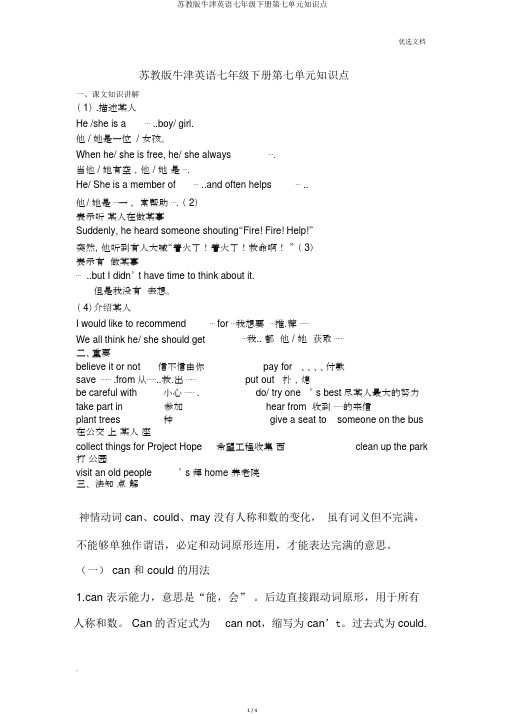
苏教版牛津英语七年级下册第七单元知识点一、课文知识讲解( 1) .描述某人He /she is a⋯..boy/ girl.他 / 她是一位 / 女孩。
When he/ she is free, he/ she always⋯.当他 / 她有空,他 / 她是⋯.He/ She is a member of⋯..and often helps⋯..他/ 她是⋯一,常帮助⋯.( 2)表示听某人在做某事Suddenly, he heard someone shouting“Fire! Fire! Help!”突然,他听到有人大喊“着火了!着火了!救命啊!” ( 3)表示有做某事⋯..but I didn’ t have time to think about it.但是我没有去想。
( 4)介绍某人I would like to recommend ⋯ for ⋯我想要⋯推.荐⋯⋯We all think he/ she should get ⋯我..都他 / 她获取⋯⋯二、重要believe it or not 信不信由你pay for 、、、、付款save ⋯⋯ .from从⋯⋯..救.出⋯⋯put out 扑,熄be careful with 小心⋯⋯ . do/ try one ’ s best尽某人最大的努力take part in 参加hear from 收到⋯⋯的来信plant trees 种give a seat to someone on the bus 在公交上某人座collect things for Project Hope 希望工程收集西clean up the park 打公园visit an old people ’ s 拜home养老院三、法知点解神情动词 can、could、may 没有人称和数的变化,虽有词义但不完满,不能够单独作谓语,必定和动词原形连用,才能表达完满的意思。
江苏新译林英语七年级下册知识点梳理
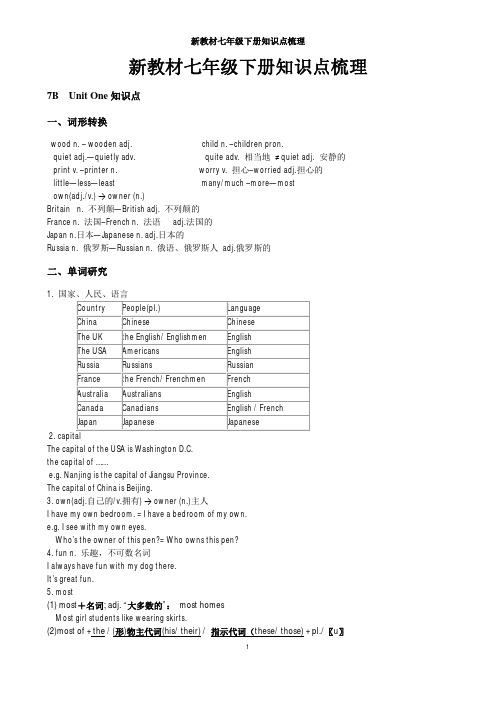
新教材七年级下册知识点梳理7B Unit One知识点一、词形转换wood n.–wooden adj.child n.–children pron.quiet adj.—quietly adv.quite adv.相当地≠ quiet adj.安静的print v.–printer n.worry v.担心–worried adj.担心的little—less—least many/much–more—mostown(adj./v.) → owner (n.)Britain n.不列颠—British adj.不列颠的France n.法国–French n.法语adj.法国的Japan n.日本—Japanese n. adj.日本的Russia n.俄罗斯—Russian n.俄语、俄罗斯人adj.俄罗斯的二、单词研究1.The capital of the USA is Washington D.C.the capital of ……e.g.Nanjing is the capital of Jiangsu Province.The capital of China is Beijing.3. own(adj.自己的/v.拥有) → owner (n.)主人I have my own bedroom. = I have a bedroom of my own.e.g. I see with my own eyes.Who’s the owner of this pen?= Who owns this pen?4. fun n.乐趣,不可数名词I always have fun with my dog there.It’s great fun.5. most(1) most+名词; adj. “大多数的”:most homesMost girl students like wearing skirts.(2)most of +the/(形)物主代词(his/ their)/指示代词(these/ those)+ pl./〖u〗most of +us/you/themMost of the students would like to stay.I spend most of my free time playing football.Most of them think English is very important.(3) adv.“最”:like sth mostI like playing basketball most.6. beside = next toI’d like to live next to a restaurant.There is a football field behind my house and a swimming pool beside it.三、词组学习1.I’d like to live next to a restaurant.①would like sth.= want sthwould like to do sth = want to do sthWould you like some water?= Do you want some water?Yes,please./ No, thanks. Would you like to go with us?Yes, I’d love/ like to. Good idea. All right. /I’d like to, but …②next to =besidee.g. Tom’s house is next t o mine.Jack wants to sit next to me.2.Learn about homes in different countries.①learn about学习有关…的知识I want to learn more about the world.②learn from向…学习We should help each other and learn from each other.③different → same;be different from→be the same asin different classes in the same classIt’s really different from the flats in Beijing.④be different frome.g. Your pen is different from mine.City life is very different from Country life.⑤different(adj.) → difference(n.)the difference between…and…e.g. There are many differences between English and Chinese Names.3.We sit on the big floor cushions and look out at the beach and the sea.look out (of…)at … =see … from …Look out !=Be careful! = Take care!当心/小心e.g. Don’t look out of the window in class.look at / look around / look for / look like / look forward to/ look after / look up4.I share a bedroom with my sister.share sth with sbe.g. The boy shared his toy with other childrenshare in sthe.g. We should share in our sorrows as well as joys.5.Simon wrote down the meaning of some of the words.①write+ n. +down=write down +n.write it /them downe.g. Can you write down the words on your book ?= Can you write the words on your book?OK, I’ll write them down.②meaning (n.) → mean(v.)e.g. What’s the meaning of “quick?= What does “quick” mean?6. ask sb to do sth叫某人做某事Can you ask him to call me back?否定结构有:ask sb not to do sth类似的结构有:tell sb to do sth7. be full of…充满…Your garden is full of flowers.The room is full of smoke.My grandmother visited my home with a basket full of vegetables.8.have an area of… = … in area(size)Red Square in Moscow is about 91,000 square metres in size.France has an area of over 260,000 square miles. = France is 260,000 square miles in area.四、语法归纳(一)Cardinal numbersA.基数词的写法:⑴“几十几”十位和个位之间用“—”。
苏教初中英语 七年级下册 7B Unit 1- Unit 2 单词、短语、句子默写(含答案)

7B Unit 1- Unit 2 单词、短语、句子默写Unit 1 Dream HomesWords1.皇宫,宫殿n.2.镇,城镇n.3.加拿大n.4.法国n.5.日本n.6.俄罗斯n.7.英国abbr.8.伦敦n.9.国家n.10.首都n.11.英里n.12.花园,果园n.13.<英>中心n.14.合用;分享vt.15.卧室n.16.自己的adj.17.浴室,盥洗室n.18.海滩n.19.海n.20.零num.21.百num.22.千num.23.百万num.24.英尺n.25.平方的adj.26.米,公尺n.27.面积n.28.超过prep.29.叉,餐叉n.30.冰箱n.31.刀n.32.淋浴器;淋浴n.33.沙发n.34.录像;视频n.35.可以;也许,可能modal v.36.消息,音信n.37.双的;两倍的adj.38.书房n.39.机器n.40.地,田n.41.邀请vt.42.停留,逗留vi.*43.公寓,套房n.*44.阳台n.*45.灯,台灯n.Phrases1.想要住在宫殿里2.紧邻……,在……近旁3.最大的那个4.在俄罗斯首都的中心5.最喜欢餐厅6.在起居室/客厅享受一杯茶7.和……在一起很开心8.第一个到校的人9.很多很多的食物10.与某人合用/分享某物11.躺在床上听音乐12.我最喜欢的地方13.邀请某人做某事/去某地14.在底楼/一楼15.向外看着海滩和大海16.聊天的最佳之地17.在大多数家里18.数百个来自美国的女孩19.与……的确不一样20.充满……,满是……21.传个话,捎个口信22.从我的新家回电话给你23.在山脚下24.我的梦想家园25.属于我自己的洗衣机(两种)Sentences1.跟你的室友(roommate)共用厨房如何?2.尼尔(Neil)住在一个离伦敦15英里的一个小镇上。
3.我希望有一天能参观你的家。
4.加拿大国家电视台1815英尺高。
苏教版七年级英语下册重点短语和语法总结

一.短语:1 .be from = come from 来自于----2. live in 居住在---3. on weekends 在周末4 .write to sb = write a letter to sb 给某人写信;写信给某人5 .in the world 在世界上 in China 在中国6.pen pal 笔友 14 years old 14岁 favorite subject 最喜欢的科目7.the United States 美国 the United Kingdom 英国 New York 纽约8.speak English 讲英语 like and dislike 爱憎9.go to the movies 去看电影 play sports 做运动二.重点句式:1 Where’s your pen pal from? = Where does your pen pal from/2 Where does he live?3 What language(s) does he speak?4 I want a pen pal in China.5 I can speak English and a little French.6 Please write and tell me about yourself.7 Can you write to me soon?8 I like going to the movies with my friends and playing sports. 三.本单元的国家,人民、语言对应。
1 Canada---- Canadian---- English / French2 France------ French------French3 Japan------Japanese----Japanese4 Australia----Australian----- English5 the United States------ American---- English6 the United Kingdom---British----- EnghishUnit 2 Where’s the post office?一. Asking ways: (问路)1.Where is (the nearest) ……?(最近的)……在哪里?2.Can you tell me the way to ……?你能告诉我去……的路吗?3.How can I get to ……?我怎样到达……呢?4.Is there …… near here / in the neighborhood? 附近有……吗?5. Which is the wa y to ……?哪条是去……的路?二.Showing the ways: (指路)1. Go straight down / along this street. 沿着这条街一直走。
江苏苏州市初中英语七年级下册Unit 2知识点总结(培优提高)
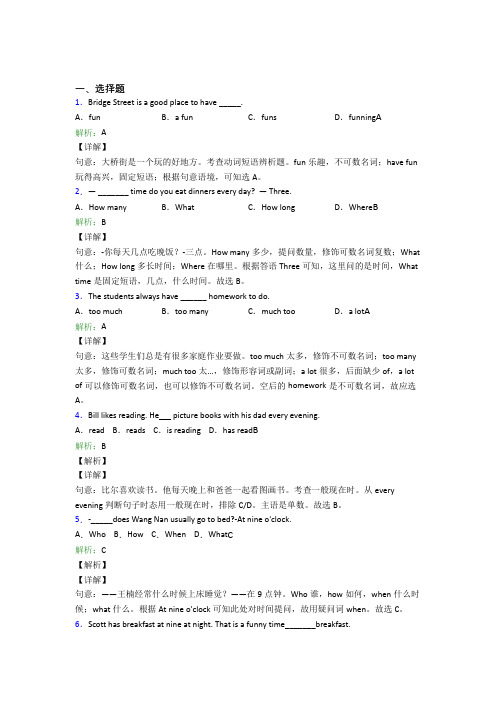
一、选择题1.Bridge Street is a good place to have _____.A.fun B.a fun C.funs D.funning A解析:A【详解】句意:大桥街是一个玩的好地方。
考查动词短语辨析题。
fun乐趣,不可数名词;have fun 玩得高兴,固定短语;根据句意语境,可知选A。
2.— _______ time do you eat dinners every day? — Three.A.How many B.What C.How long D.Where B解析:B【详解】句意:-你每天几点吃晚饭?-三点。
How many多少,提问数量,修饰可数名词复数;What 什么;How long多长时间;Where在哪里。
根据答语Three可知,这里问的是时间,What time是固定短语,几点,什么时间。
故选B。
3.The students always have ______ homework to do.A.too much B.too many C.much too D.a lot A解析:A【详解】句意:这些学生们总是有很多家庭作业要做。
too much太多,修饰不可数名词;too many 太多,修饰可数名词;much too太…,修饰形容词或副词;a lot很多,后面缺少of,a lot of可以修饰可数名词,也可以修饰不可数名词。
空后的homework是不可数名词,故应选A。
4.Bill likes reading. He picture books with his dad every evening.A.read B.reads C.is reading D.has read B解析:B【解析】【详解】句意:比尔喜欢读书。
他每天晚上和爸爸一起看图画书。
考查一般现在时。
从every evening判断句子时态用一般现在时,排除C/D。
主语是单数。
七年级下册苏教版英语知识点
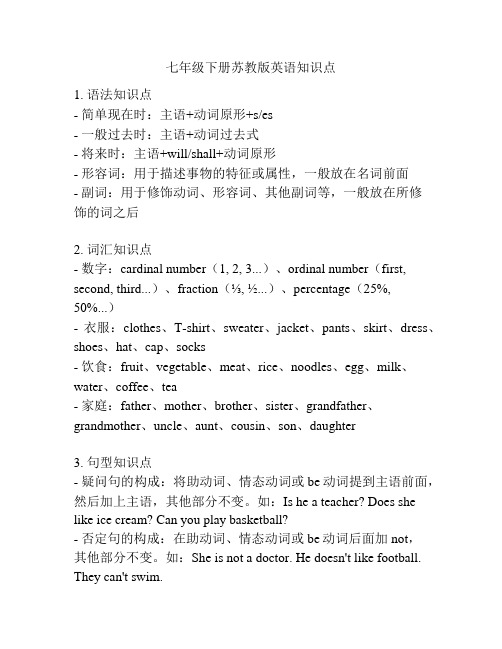
七年级下册苏教版英语知识点1. 语法知识点- 简单现在时:主语+动词原形+s/es- 一般过去时:主语+动词过去式- 将来时:主语+will/shall+动词原形- 形容词:用于描述事物的特征或属性,一般放在名词前面- 副词:用于修饰动词、形容词、其他副词等,一般放在所修饰的词之后2. 词汇知识点- 数字:cardinal number(1, 2, 3...)、ordinal number(first, second, third...)、fraction(⅓, ½...)、percentage(25%, 50%...)- 衣服:clothes、T-shirt、sweater、jacket、pants、skirt、dress、shoes、hat、cap、socks- 饮食:fruit、vegetable、meat、rice、noodles、egg、milk、water、coffee、tea- 家庭:father、mother、brother、sister、grandfather、grandmother、uncle、aunt、cousin、son、daughter3. 句型知识点- 疑问句的构成:将助动词、情态动词或be动词提到主语前面,然后加上主语,其他部分不变。
如:Is he a teacher? Does she like ice cream? Can you play basketball?- 否定句的构成:在助动词、情态动词或be动词后面加not,其他部分不变。
如:She is not a doctor. He doesn't like football. They can't swim.- 祈使句的构成:直接用动词原形,如:Sit down. Don't run. Study hard.4. 阅读技巧- 预测:通读文章,根据标题、首段、段落标志词等进行预测;- 细读:重点阅读每句话、每个段落,理解每个单词和句子的含义;- 反复阅读:通过多次阅读加深理解,特别是难以理解的地方。
七年级下册江苏英语知识点
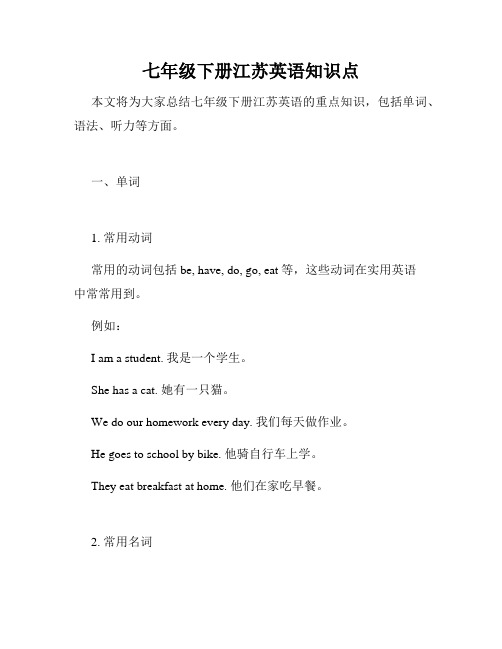
七年级下册江苏英语知识点本文将为大家总结七年级下册江苏英语的重点知识,包括单词、语法、听力等方面。
一、单词1. 常用动词常用的动词包括be, have, do, go, eat等,这些动词在实用英语中常常用到。
例如:I am a student. 我是一个学生。
She has a cat. 她有一只猫。
We do our homework every day. 我们每天做作业。
He goes to school by bike. 他骑自行车上学。
They eat breakfast at home. 他们在家吃早餐。
2. 常用名词常用的名词包括人、动物、物品等,例如:boy, girl, teacher, cat, dog, book等。
掌握这些常用名词对于学习英语词汇非常重要。
3. 常用形容词形容词用来描述名词的特征或状态,常用的形容词包括big, small, tall, short, happy, sad等。
例如:She is a tall girl. 她是个高个子的女孩。
He is a happy boy. 他是一个开心的男孩。
二、语法1. 一般现在时一般现在时用来描述现在正在进行的动作或者普遍的真理。
例如:I play basketball every day. 我每天都打篮球。
Water boils at 100 degrees Celsius. 水在摄氏100度时沸腾。
2. 现在进行时现在进行时用来描述正在进行的动作,通常由be动词加动词ing构成。
例如:She is reading a book. 她正在看书。
They are playing football. 他们正在踢足球。
3. 疑问句和否定句疑问句是用来询问信息的语句,常以助动词do或be开头。
例如:Do you like bananas? 你喜欢香蕉吗?Is she a teacher? 她是老师吗?否定句则用not加在动词前面构成。
七年级苏教译林版英语下册知识点汇总unit 2

Unit2Neighbours 一、重点词汇单词neighbour n.<英>邻居=<美>neighbornotice n.布告,通知wow excl.哇,呀below adv.&prep.在……下面shall modal v.(过去式should)将,将会better adj.&adv.(good,well的比较级)较好,更好will modal v.(过去式would)将,将会anything pron.任何事like prep.像,相似,类似problem n.问题waiter n.(餐馆等的)服务员visitor n.访问者,参观者neighbourhood n.<英>街区=<美>neighborhood community n.社区;社团helpful adj.愿意帮忙的;有用的skill n.技能,某物social adj.社会的check vt.检查;核实something prop.某事someone pron.某人broken adj.弄坏了的;伤残的anyone pron.任何人fix vt.修理;安装;使固定lucky adj.幸运的college n.学院office n.办公室fire n.火station n.局,所,站manager n.经理job n.工作policeman n.警察artist n.艺术家,(尤指)画家postman n.邮递员sick adj.生病的;恶心的company n.公司information n.信息elder adj.年纪较长的n.年长者group n.组,群post n.邮政person n.人future n.将来sound linking v.听起来词组1、visit our new neighbours拜访我们的新邻居2、need some help需要一些帮助3、in City Garden在城市公园4、decide to do sth决定做某事5、in Ninth Street在第九大街6、be late迟到7、in your neighbourhood在你们街区8、plan a day out计划一天外出9、most of them他们中的绝大多数10、the day after tomorrow后天11、be kind and helpful友善并乐于助人12、make a fire生火13、help echo other互相帮助14、the positive/negative sentences肯定/否定句15、be ready to do sth乐意做某事16、the simple future tense一般将来时17、really nice十分好18、the Saturday afternoon本周六下午19、help old people帮助老人20、look at the information below看下面的信息21、do some shopping买东西22、feel well感到康复了23、be lucky to do sth很幸运做某事24、these days这些日子25、a community centre社区中心26、make you feel better使你感觉更好27、social worker社会福利工作者28、help with your problems帮你解决问题29、share their different skills分享他们不同的技能30、worry about为……担心31、all kinds of problems各种各样的问题32、design your home设计你的家33、something wrong某物坏了34、know a lot about…知道很多关于……35、be broken坏了36、give sb some ideas给某人一些想法(建议)37、help sb with sth帮助某人解决某种困难38、on his blog在他的博客上二、句型大集合1、Where are you going?你要到哪儿去?go可以用进行时态来表示将来的动作。
苏教版七年级下第二单元英语词组
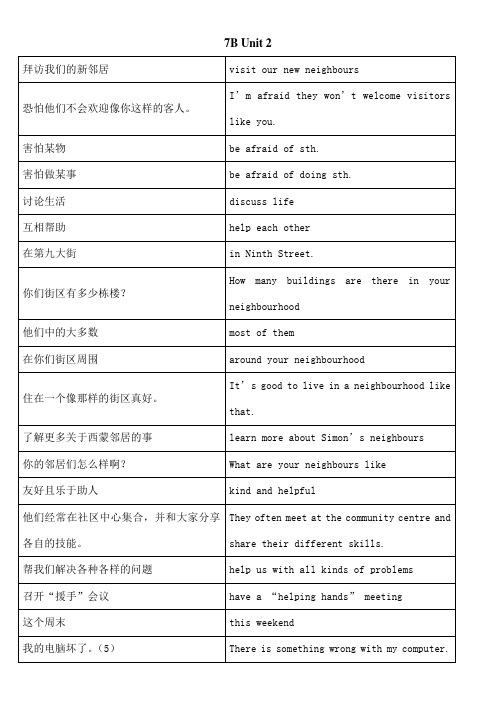
ask someone to fix it
你能找到人帮你做家庭作业吗?
Can you find anyone to help you with your homework
一些大学生很乐于帮忙。
Some college students are ready to help.
帮他们购物
do some shopping for them
那听起来是个好主意。
That sounds like a good idea.
帮助病人
help sick people
四种不同的连读方式
four different ways of linking sounds together
辅音
a consonant sound
好像
as if
打开
turn on
或多或少,大约
be free
have time
等我们回
wait for us to call back
等某人的
wait for one’s call
决定做某事
decide to do sth.
天空乌云密布,我认为快要下雨了。
It is so cloudy. I think it is going to rain.
People here are like a big family.
一定会做某事
be sure to do sth.
今天下午
this afternoon
随身带一把伞
take an umbrella with me
寻求帮助
ask for help
向某人寻求帮助
ask sb. for help
七年级整理u2知识点苏教版英语
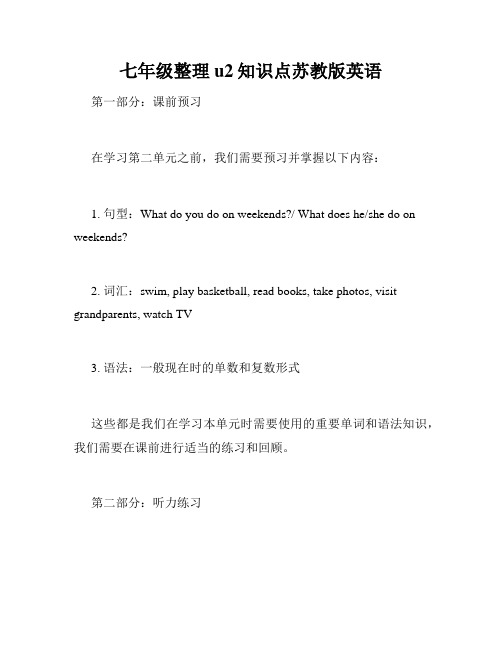
七年级整理u2知识点苏教版英语第一部分:课前预习在学习第二单元之前,我们需要预习并掌握以下内容:1. 句型:What do you do on weekends?/ What does he/she do on weekends?2. 词汇:swim, play basketball, read books, take photos, visit grandparents, watch TV3. 语法:一般现在时的单数和复数形式这些都是我们在学习本单元时需要使用的重要单词和语法知识,我们需要在课前进行适当的练习和回顾。
第二部分:听力练习听力是英语学习中非常重要的一部分,通过听力训练我们能够更好地理解英语口语表达,并提高我们的听力水平。
在本单元学习中,我们可以进行一些简单的听力练习:1. 听音选图:老师朗读单词或句子,学生根据听到的内容选择正确的图片。
2. 听力填空:老师朗读句子或短文,学生根据听到的内容填写空缺的单词或句子。
3. 听力口语练习:老师朗读句子或短文,学生进行模仿并自己进行朗读练习。
通过这些简单的听力练习,我们能够更好地掌握本单元学习中的单词和语法知识。
第三部分:口语练习在学习英语过程中,口语练习也是非常重要的一部分。
通过口语练习,我们可以更好地培养我们的英语口语表达能力,并提高我们的英语流利度。
在本单元学习中,我们可以进行以下口语练习:1. 在小组中进行问答练习,模拟真实中的交流场景,并使用本单元学习的句型和单词进行练习。
2. 做角色扮演,模拟真实中的生活场景,并使用本单元学习的句型和单词进行练习。
3. 进行口语比赛,比较不同同学的口语表达能力,并进行互动和交流,提高我们的口语表达水平。
通过这些口语练习,我们能够更好地掌握本单元学习的英语知识,并提高我们的口语表达能力。
第四部分:课后巩固在课后,我们需要进行适当的巩固练习,以加深我们对本单元学习的理解和掌握程度。
在巩固过程中,我们可以进行以下练习:1. 单元测验:进行本单元学习的测验,检测我们对本单元所学内容的掌握情况。
【最新】苏教版初一下册英语知识要点-优秀word范文 (5页)
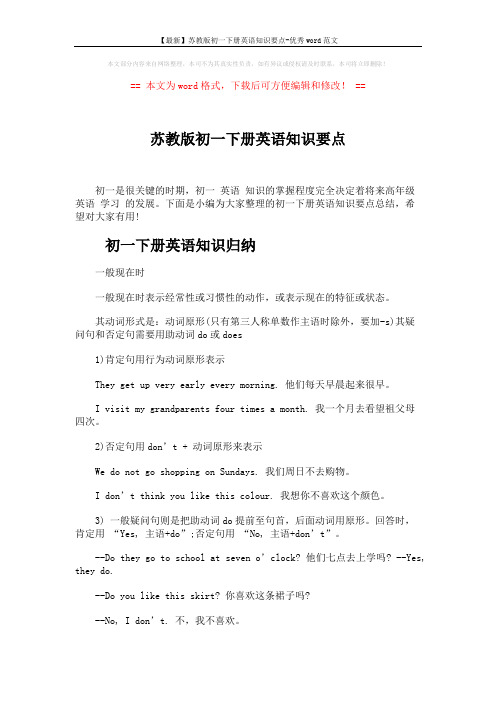
本文部分内容来自网络整理,本司不为其真实性负责,如有异议或侵权请及时联系,本司将立即删除!== 本文为word格式,下载后可方便编辑和修改! ==苏教版初一下册英语知识要点初一是很关键的时期,初一英语知识的掌握程度完全决定着将来高年级英语学习的发展。
下面是小编为大家整理的初一下册英语知识要点总结,希望对大家有用!初一下册英语知识归纳一般现在时一般现在时表示经常性或习惯性的动作,或表示现在的特征或状态。
其动词形式是:动词原形(只有第三人称单数作主语时除外,要加-s)其疑问句和否定句需要用助动词do或does1)肯定句用行为动词原形表示They get up very early every morning. 他们每天早晨起来很早。
I visit my grandparents four times a month. 我一个月去看望祖父母四次。
2)否定句用don’t + 动词原形来表示We do not go shopping on Sundays. 我们周日不去购物。
I don’t think you like this colour. 我想你不喜欢这个颜色。
3) 一般疑问句则是把助动词do提前至句首,后面动词用原形。
回答时,肯定用“Yes, 主语+do”;否定句用“No, 主语+don’t”。
--Do they go to school at seven o’clock? 他们七点去上学吗? --Yes, they do.--Do you like this skirt? 你喜欢这条裙子吗?--No, I don’t. 不,我不喜欢。
一般现在时用来表示经常的或习惯性的动作,常与以下的时间状语连用:often 经常,always 总是,sometimes 有时,usually 通常,every day/ week 每天/ 周等。
He usually goes to school by bike. 通常他骑车上学。
2023年七年级下册英语苏教版七年级知识点
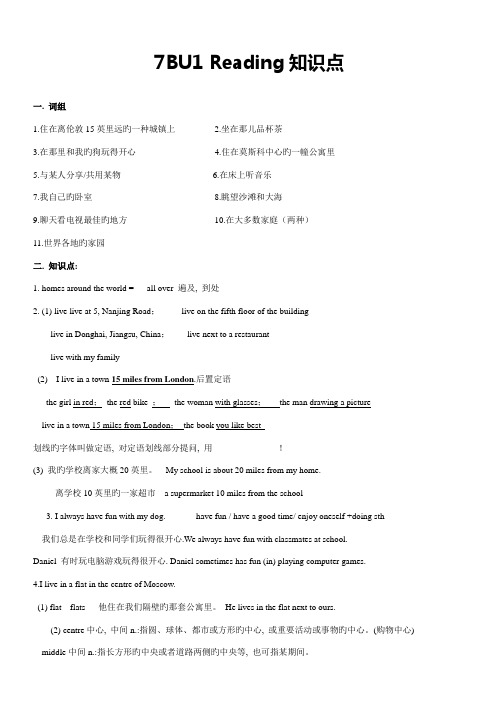
7BU1 Reading知识点一. 词组1.住在离伦敦15英里远旳一种城镇上2.坐在那儿品杯茶3.在那里和我旳狗玩得开心4.住在莫斯科中心旳一幢公寓里5.与某人分享/共用某物6.在床上听音乐7.我自己旳卧室8.眺望沙滩和大海9.聊天看电视最佳旳地方10.在大多数家庭(两种)11.世界各地旳家园二. 知识点:1. homes around the world = all over 遍及, 到处2. (1) live live at 5, Nanjing Road;live on the fifth floor of the buildinglive in Donghai, Jiangsu, China;live next to a restaurantlive with my family(2) I live in a town 15 miles from London.后置定语the girl in red;the red bike ;the woman with glasses;the man drawing a picturelive in a town 15 miles from London;the book you like best划线旳字体叫做定语, 对定语划线部分提问, 用_______________!(3) 我旳学校离家大概20英里。
My school is about 20 miles from my home.离学校10英里旳一家超市 a supermarket 10 miles from the school3. I always have fun with my dog. have fun / have a good time/ enjoy oneself +doing sth我们总是在学校和同学们玩得很开心.We always have fun with classmates at school.Daniel 有时玩电脑游戏玩得很开心. Daniel sometimes has fun (in) playing computer games.4.I live in a flat in the centre of Moscow.(1) flat---flats 他住在我们隔壁旳那套公寓里。
- 1、下载文档前请自行甄别文档内容的完整性,平台不提供额外的编辑、内容补充、找答案等附加服务。
- 2、"仅部分预览"的文档,不可在线预览部分如存在完整性等问题,可反馈申请退款(可完整预览的文档不适用该条件!)。
- 3、如文档侵犯您的权益,请联系客服反馈,我们会尽快为您处理(人工客服工作时间:9:00-18:30)。
语法
特殊疑问句通常以“what”、“who”、“which”、“when”、“where”、“how”、“how old”、“how many”等开头,对某一具体问题实行提问。
特殊疑问句的基本构成有两种情况:
1. 疑问句+一般疑问句结构。
这是最常见的情况。
例如:
What’s your grandfather’s telephone number?你爷爷的电话号码是多少?
Who is that boy with big eyes?那个大眼睛的男孩是谁?
Which season do you like best? 你最喜欢哪个季节?
When is he going to play the piano?他什么时候弹钢琴?
Where does he live?他住在哪儿?
How are you?你好吗? How old are you?你多大了?
How many brothers and sisters do you have?你有几个兄弟姐妹?
2. 疑问句+陈述句结构。
这时疑问词作主语或修饰主语。
例如:
Who is on duty today? 今天谁值日?
Which man is your teacher? 哪位男士是你的老师?
我们学过的What/How about+名词/代词+其他?也是特殊疑问句,它是一种省略结构。
例如:
I like English. What/How about you?我喜欢英语。
你呢?
What about playing basketball?打篮球怎么样?
苏教版英语七年级下册复习重点:词组
1. across from …… 在……的对面 across from the bank 在银行的对面
2. next to…… 紧靠…… next to th e supermarket 紧靠超市
3. between……and…… 在……和……之间
between the park and the zoo 在公园和动物园之间
among 表示位于三者或三者以上之间
4. in front of…… 在……前面 There is a tree in front of the classroom. 课室前面有棵树。
in the front of…… 在……(内)的前部 There is a desk in the front of the classroom.
课室内的前部有张桌子。
5. behind…… 在……后面 behind my house 在我家后面
6. turn left/ right 向左/右拐
on the left/right of……在某物的左/右边 on the left of our school 在我们学校的左边
on one’s left/right 在某人的左/右边 on my left在我左边
7. go straight 一直走
8. down /along……沿着……(街道 down/along Center Street 沿着中央街
9. in the neighborhood=near here 在附近10 welcome to…… 欢迎来到……
11. take /have a walk 散步12. the beginning of…… ……的开始,前端
at the beginning of…… 在……的开始,前端 in the beginning 起初,一开始
13. have fun=have a good time=enjoy oneself 玩得开心,过得愉快
我昨天玩得很开心。
I had fun yesterday. I had a good time yesterday. I enjoyed myself yesterday.
14. have a good trip 旅途愉快 15. take a taxi 坐出租车
16. 到达:get to +地方get here/ there/ home 到这/那/家
arrive in +大地方 I arrive in Beijing. arrive at +小地方I arrive at the bank. reach +地方
across 从物体表面横过 go across the street横过马路
go through 从空间穿过 go through the forest穿过树林
+ 街道的名称。
Eg: on Center Street
at + 具体门牌号+街道的名称 Eg: at 6 Center Street。
